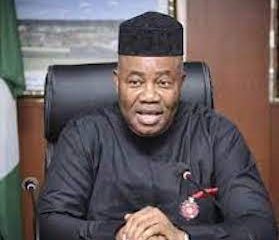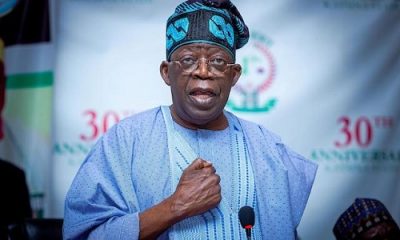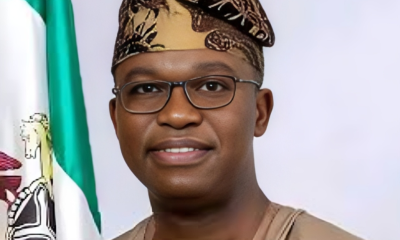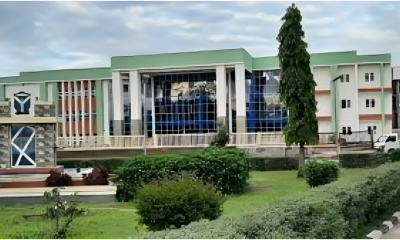Economy
FOREX Code, Cardoso’s Approach to Stabilizing the Naira

By Ibrahim Modibbo
Within hours after the launch of foreign exchange code by the Governor of the Central Bank of Nigeria (CBN), Olayemi Cardoso, on January 28, 2025, in Abuja, the positives from this move by the apex bank emerged as the naira appreciated against the US dollar.
Following the launch of the FX code on Tuesday, the naira appreciated by 0.
97 percent, gaining N16 against the dollar in the parallel market, by trading at an average rate of N1, 634 compared to N1, 650 it traded on Monday. In the official window, data from the CBN revealed that the naira was quoted at N1, 533.50 to the dollar at the Nigerian Foreign Exchange Market (NFEM).Cardoso’s newly introduced FX code is aimed at improving market liquidity, enhancing transparency, and providing guidance for all those participating in the country’s foreign exchange sector.
The code represents a set of principles that are not only encouraged, but accepted as best practices in the global foreign exchange market. The CBN as the regulator of Nigeria’s turbulent forex market drafted the FX code to address risks associated with the emerging financial landscape in the nation, while also strengthening the integrity and functionality of the foreign exchange market.The CBN in developing the FX code is responding to Nigeria’s financial transformation in recent years and the attendant risks associated with such a growth, in spite of significant progress recorded. The code seeks to establish standards that ensure the efficient functioning of the wholesale FX market, further reinforcing the country’s flexible exchange rate system. It will further promote a robust market that’s characterised by fairness, openness, and adequate transparency, enabling a diverse group of participants to engage effectively at competitive rates that reflect accurate market information. It outlines behavioral standards and best practices that align with global expectations.
Addressing industry players at the launch and alluding to the deep insights and interactions with them, Cardoso said that the acceptance of the FX code reflects the collective vision of everyone for a foreign exchange market built on integrity, fairness, transparency and efficiency, based on its critical nature for Nigeria’s economic growth and stability.
Making reference to the words of the late Nelson Mandela, on the need for leaders to be great listeners, the CBN governor admitted that the apex bank through its interactions with industry players, better understands the perspectives, concerns, and recommendations they expressed. He said the ideas shared reaffirmed the collective commitment to shaping a more resilient and transparent FX market.
He declared that the FX code represents a decisive step forward by the CBN, to set a clear and enforceable standards for ethical conduct, transparency, and good governance in Nigeria’s foreign exchange market. The code, Cardoso added is a firm signal that business-as-usual in the forex market has ended because the code is a blueprint for the future, that is grounded in the hard lessons of the past.
“We must not forget where we are coming from. The era of multiple exchange rates, which created privileges for a select few at the expense of most Nigerians, severely undermined market integrity. As an example, the $7billion of FX backlogs that has taken over 12 months to verify has led to the discovery of multiple unethical and even illegal practices that we should not be proud of as a nation,” he disclosed.
The CBN governor further stated that the period of unprecedented ways-and-means-financing that inflicted significant damage on Nigeria’s economy, contributing to rising inflation, currency depreciation, and eroded public confidence in government’s ability to deal with adverse economic issues is over.
“These practices must never return. The FX Code is a firm rejection of such distortions and an equally firm commitment to a future defined by fairness, trust and market-driven principles. Let us be clear: the system itself played a key role in the challenges of the past.
“Unethical behaviours and systemic abuses – whether by those with privileged access or by complicit participants – eroded public trust and harmed our economy. We will not tolerate any attempts to revert to those practices. Any individual or institution that violates the FX Code will face swift and decisive sanctions,” Cardoso warned.
Predicting the future, he expressed confidence that the nation’s journey towards market reforms is already yielding positive results. According to him, 2024 was marked by structural reforms which sought to return the naira to a freely determined market price and ease volatility.
Such reforms include the discontinuation of quasi-fiscal interventions, unifying the exchange rate windows, clearing a backlog of foreign exchange commitments, and recalibrating monetary policy tools to redirect the course of Nigeria’s economy, restore order and credibility to our FX market, and refocus the CBN on discharging its core mandates.
Cardoso used the opportunity of the FX code to reel out some notable achievements of his stewardship, pointing to the introduction of the Electronic Foreign Exchange Matching System (EFEMS) in December 2024 that has improved market transparency and efficiency. Since its launch, the naira has appreciated significantly—from ₦1, 663.90 on December 2,
2024, to ₦1, 536.72 as of January 28, 2025. Also worthy of mention is the country’s external reserves that have grown by 12.74 percent, reaching $40.68 billion at the end of 2024.
He emphasized the importance of exchange rate stability, describing it as the cornerstone of macro-economic health for an economy like Nigeria’s. The apex bank governor said that beyond daily market rates, the exchange rate influences critical indicators such as the balance of payments, external reserves, international trade, inflation, economic growth, and foreign investment. These factors collectively, he submitted shape the economic welfare of the nation and that of Nigerians.
To Cardoso, tackling rising inflation remains a major challenge of the CBN under his watch, as in his view, rising prices erode the purchasing power of Nigerians and increases the cost of living. However, he believes strongly too that by fostering an exchange rate stability, the problem of inflation can be tackled head-on.
The FX code, the CBN chief asserted marks a new era of compliance and accountability. The code, he declared is not just a set of recommendations, but an enforceable framework, warning industry players that under the CBN Act, 2007 and BOFIA Act, 2020, violations will be met with penalties and administrative actions. He told stakeholders who attended the launch that they must recognize that adherence to the code is not merely about compliance but about restoring public trust in Nigeria’s financial system.
“Beyond the foreign exchange market, the FX code forms part of our renewed focus on compliance across the financial services industry and I am particularly pleased that we have the leadership of the industry to reinforce a collective commitment to the journey ahead. Self-regulation and conduct are at the core of the changes in culture we expect to see at play in the industry, and I expect the principles of the FX code to be applied across other business areas.
“The FX code is built on six core principles—ethics, governance, execution, information sharing, risk management and compliance, and confirmation and settlement processes. These principles align with international standards, while addressing Nigeria’s unique challenges. Together, they provide the foundation for a resilient and transparent market that inspires confidence among both domestic and international participants.
“Today, as we formally launch the FX code, I call on all market participants to embrace its principles wholeheartedly. The six guiding principles and 52 sub-principles must become the standard for conduct across all participating institutions. Leaders in this room – board chairs, managing directors, and chief compliance officers – must lead from the front. Embedding these standards within your organizations is not optional,” Cardosa stated.
He reiterated that the eras of opaque practices is over because the CBN will not hesitate to deal with any institution or individual that undermines the integrity of the financial markets. The code, he added, serves as a collective pledge to transparency, ethical conduct, and fairness in the forex market, and that most importantly, through strict adherence to the code, Nigeria can build a financial ecosystem that embodies resilience, global competitiveness, and economic prosperity.
Dr Modibbo is an Abuja based Development communication analyst.
Economy
World Bank Cuts Global Growth Forecast to 2.3% for 2025

Global economic growth is projected to slow to 2.3 per cent in 2025 due to mounting trade tensions and persistent policy uncertainty, according to the World Bank’s latest Global Economic Prospects report.
A statement from the bank’s Online Media Briefing Centre on Tuesday noted that the new forecast was nearly half a percentage point lower than the rate projected at the beginning of the year.
The report indicated that the slowdown would mark the weakest non-recessionary global growth since 2008.
“The turmoil has resulted in growth forecasts being cut in nearly 70 per cent of all economies, across all regions and income groups,” the report states.
In spite of the gloomy outlook, a global recession is not anticipated. However, if current projections hold, average global growth in the first seven years of the 2020s would be the slowest of any decade since the 1960s.
Indermit Gill, the World Bank Group’s Chief Economist and Senior Vice-President for Development Economics, warned of deepening stagnation in the developing world.
“Outside of Asia, the developing world is becoming a development-free zone. It has been advertising itself for more than a decade,” he said.
Gill noted that growth in developing economies had declined steadily, from 6 per cent annually in the 2000s, to 5 per cent in the 2010s, and to under 4 per cent in the 2020s.
This trend mirrored the slowdown in global trade, which fell from an average of 5 per cent in the 2000s to under 3 per cent today. Investment growth had also weakened, while debt had surged to record levels.
The report projected that growth would slow in nearly 60 per cent of developing economies in 2025, averaging 3.8 per cent before a modest rise to 3.9 per cent in 2026 and 2027.
The report added that more than a full percentage point below the average of the 2010s.
“Growth in low-income countries is expected to reach 5.3 per cent in 2025, a 0.4 percentage point downgrade from earlier forecasts.
“Tariff hikes and tight labor markets are expected to keep global inflation elevated, with a projected average of 2.9 per cent in 2025, still above pre-pandemic levels.”
The World Bank warned that slowing growth would hinder efforts by developing economies to create jobs, reduce poverty, and close the income gap with advanced economies.
“Per capita income growth in these economies is forecast at 2.9 per cent in 2025, 1.1 percentage points below the 2000–2019 average.
“Assuming developing countries (excluding China) maintain a GDP growth rate of 4 per cent the forecast for 2027, it would take them about two decades to return to their pre-pandemic growth trajectory.”
Still, the report noted that global growth could rebound more quickly if major economies reduced trade tensions.
It said that resolving current disputes and halving tariffs could boost global growth by 0.2 percentage points over 2025 and 2026.
In response to rising protectionism, the World Bank urged developing economies to diversify trade, pursue strategic partnerships, and engage in regional agreements.
Given constrained public resources and growing development needs, policymakers are encouraged to mobilise domestic revenue, prioritise spending for the most vulnerable, and enhance fiscal management.
To drive sustainable growth, the report emphasised the need to improve business environments, expand productive employment, and align workforce skills with market demands.
Finally, it highlighted the importance of global cooperation in supporting the most vulnerable economies through multilateral initiatives, concessional financing, and targeted relief for countries affected by conflict.(NAN)
Economy
Eid-el-Kabir: Ram Sellers Decry Low Patronage as Prices Soar in Ile-Ife

The Chairman, Ram Sellers’ Association, Odo-Ogbe Market, Ile-Ife, Osun, Alhaji Akeem Salahudeen, has complained of low patronage, attributing it to high cost of rams and the economy situation in the country.
Salahudeen stated this in an interview on Wednesday in Ile-Ife.
He said that the big sized ram which was sold between N550,000 and N620,000 last year are now being sold at the rate of N800,000 to N1.
2 million.He added that the medium sized ram which was sold between N300,000 and N350,000 last year is now going for between N450,000 and N550,000.
According to him, small sized ram sold for N200,000 and N230,000 last year now attracts N300,000 and N450,000 this year.
He attributed the increase in the prices of rams in this year’s Sallah to the insecurity in the North, which he claimed had disrupted the supply chain.
“They said the worsening insecurity in the North has forced some sellers to import rams from neighbouring countries like Niger, Mali and Chad, which they said contributed to the high prices,” he emphasised.
At Sabo Cattle Market in Ile-Ife, Alhaji Saheed Yaro, said that the price of rams has surged as the small sized ram which was sold at N150,000 and N180,000 last year, is now being sold between N250,000 and N350,000.
Yaro added that the price of medium sized ram which was between N185,000 and N260,000 last year now goes for between N350,000 to N450,000.
Accordingly, the big sized ram sold between N480,000 and N500,000 last year is now between N550,000 and N780,000.
At Boosa Cattle Market located at Modakeke, Mr Musa Salami stated that prices of rams have witnessed sharp increase with a medium sized ram which was for N170,000 to N200,000 last year is now at N250,000 to N300,000.
Salami stated further that the big sized ram that was sold at N350,000 and N400,000 is now being sold at N600,000 to N750,000.
He added that he brought 150 rams a week ago, but has been able to sell only 15, explaining that many customers turned back on hearing prices without buying.
He noted that customers who usually bought rams from him over the years are now complaining about costs.
NAN reports that ram sellers expressed concern over low patronage in many markets, saying that customers were lamenting the high cost of the animals.
A civil servant, Mr Bayo Olabisi, said that most workers in the state cannot afford to buy rams for this year’s Eid-el-Kabir due to the high prices and the economic hardship.
Olabisi added that the present economic hardship has been taken a toll on the workers, especially with the high transportation and other costs following the removal of fuel subsidy by the government.
“In fact, I visited three places where they sell rams, but I couldn’t buy any because I can’t afford to buy.
“When I priced a medium sized ram, the seller told me N250,000, the same size of ram I bought for N150,000 last year.
“I would rather use part of my salary to buy half bag of rice and two chickens for my family.
“For Allah has said that if you can’t afford ram, you should not borrow or buy on credit because there’s no reward on that,“ he said. (NAN)
Economy
We’ll Continue Borrowing Within Sustainable Limits- FG

The Federal Government says it will continue to borrow within manageable and sustainable limits in accordance with the Debt Management Office (DMO) debt sustainability framework.
This is contained in a statement by the Director, Information and Public Relations in the Ministry of Finance, Mr Mohammed Manga, in Abuja on Wednesday.
President Bola Tinubu recently requested the approval of the 2024 – 2026 external borrowing rolling plan from the National Assembly.
Tinubu has requested the National Assembly’s approval to secure external loans of 21.5 million dollars and 15 billion Yuan, along with a grant of 65 million Euro, as part of the federal government’s proposed 2025–2026 external borrowing plan.
Manga said that the proposed borrowing plan was an essential component of the Medium-Term Expenditure Framework (MTEF) in accordance with both the Fiscal Responsibility Act 2007 and the DMO Act 2003.
“The plan outlines the external borrowing framework for both the federal and sub-national governments over a three-year period, accompanied by five detailed appendices on the projects, terms and conditions, implementation period, etc.
“By adopting a structured, forward-looking approach, the plan facilitates comprehensive financial planning and avoids the inefficiencies of ad-hoc or reactive borrowing practices.
“This strategic method enhances the country’s ability to implement effective fiscal policies and mobilise development resources,” he said.
According to the statement, the borrowing plan does not equate to actual borrowing for the period.
“The actual borrowing for each year is contained in the annual budget. In 2025, the external borrowing component is 1.23 billion dollars, and it has not yet been drawn.
“This is planned for H2 2025, the plan is for both federal and several state governments across numerous geopolitical zones including Abia, Bauchi, Borno, Gombe, Kaduna, Lagos, Niger, Oyo, Sokoto, and Yobe States.
“Importantly, it should be noted that the borrowing rolling plan does not equate to an automatic increase in the nation’s debt burden.
“The nature of the rolling plan means that borrowings are split over the period of the projects, for example, a large proportion of projects in the 2024–2026 rolling plan have multi-year drawdowns of between five to seven years which are project-tied loans,” Manga said.
He said that these projects cut across critical sectors of the economy, including power grids and transmission lines, irrigation for improving food security, fibre optics network across the country, fighter jets for security, rail and road infrastructure.
According to him, the majority of the proposed borrowing will be sourced from the country’s development partners, like the World Bank, African Development Bank, French Development Agency, European Investment Bank, JICA, China EximBank, and the Islamic Development Bank.
Manga said that these institutions offer concessional financing with favourable terms and long repayment periods, thereby supporting Nigeria’s development objectives sustainably.
He said that the government seeks to reiterate that the debt service to revenue ratio has started decreasing from its peak of over 90 per cent in 2023.
Manga said that the government has ended the distortionary and inflationary ways and means.
According to him, there is significant revenue expectations from the Nigerian National Petroleum Corporation Limited (NNPC Ltd), technology-enabled monitoring and collection of surpluses from government owned enterprises and revenue-generating ministries, departments, and agencies and legacy outstanding dues.
“Having achieved a fair degree of macroeconomic stabilisation, the overarching goal of the federal government is to pivot the economy onto a path of rapid, sustained, and inclusive economic growth.
“Achieving this vision requires substantial investment in critical sectors such as transportation, energy, infrastructure, and agriculture.
“These investments will lay the groundwork for long-term economic diversification and encourage private sector participation.
“Our debt strategy is therefore guided not solely by the size of our obligations, but by the utility, sustainability, and economic returns of the borrowing,” he said.(NAN)
The Federal Government says it will continue to borrow within manageable and sustainable limits in accordance with the Debt Management Office (DMO) debt sustainability framework.
This is contained in a statement by the Director, Information and Public Relations in the Ministry of Finance, Mr Mohammed Manga, in Abuja on Wednesday.
President Bola Tinubu recently requested the approval of the 2024 – 2026 external borrowing rolling plan from the National Assembly.
Tinubu has requested the National Assembly’s approval to secure external loans of 21.5 million dollars and 15 billion Yuan, along with a grant of 65 million Euro, as part of the federal government’s proposed 2025–2026 external borrowing plan.
Manga said that the proposed borrowing plan was an essential component of the Medium-Term Expenditure Framework (MTEF) in accordance with both the Fiscal Responsibility Act 2007 and the DMO Act 2003.
“The plan outlines the external borrowing framework for both the federal and sub-national governments over a three-year period, accompanied by five detailed appendices on the projects, terms and conditions, implementation period, etc.
“By adopting a structured, forward-looking approach, the plan facilitates comprehensive financial planning and avoids the inefficiencies of ad-hoc or reactive borrowing practices.
“This strategic method enhances the country’s ability to implement effective fiscal policies and mobilise development resources,” he said.
According to the statement, the borrowing plan does not equate to actual borrowing for the period.
“The actual borrowing for each year is contained in the annual budget. In 2025, the external borrowing component is 1.23 billion dollars, and it has not yet been drawn.
“This is planned for H2 2025, the plan is for both federal and several state governments across numerous geopolitical zones including Abia, Bauchi, Borno, Gombe, Kaduna, Lagos, Niger, Oyo, Sokoto, and Yobe States.
“Importantly, it should be noted that the borrowing rolling plan does not equate to an automatic increase in the nation’s debt burden.
“The nature of the rolling plan means that borrowings are split over the period of the projects, for example, a large proportion of projects in the 2024–2026 rolling plan have multi-year drawdowns of between five to seven years which are project-tied loans,” Manga said.
He said that these projects cut across critical sectors of the economy, including power grids and transmission lines, irrigation for improving food security, fibre optics network across the country, fighter jets for security, rail and road infrastructure.
According to him, the majority of the proposed borrowing will be sourced from the country’s development partners, like the World Bank, African Development Bank, French Development Agency, European Investment Bank, JICA, China EximBank, and the Islamic Development Bank.
Manga said that these institutions offer concessional financing with favourable terms and long repayment periods, thereby supporting Nigeria’s development objectives sustainably.
He said that the government seeks to reiterate that the debt service to revenue ratio has started decreasing from its peak of over 90 per cent in 2023.
Manga said that the government has ended the distortionary and inflationary ways and means.
According to him, there is significant revenue expectations from the Nigerian National Petroleum Corporation Limited (NNPC Ltd), technology-enabled monitoring and collection of surpluses from government owned enterprises and revenue-generating ministries, departments, and agencies and legacy outstanding dues.
“Having achieved a fair degree of macroeconomic stabilisation, the overarching goal of the federal government is to pivot the economy onto a path of rapid, sustained, and inclusive economic growth.
“Achieving this vision requires substantial investment in critical sectors such as transportation, energy, infrastructure, and agriculture.
“These investments will lay the groundwork for long-term economic diversification and encourage private sector participation.
“Our debt strategy is therefore guided not solely by the size of our obligations, but by the utility, sustainability, and economic returns of the borrowing,” he said.(NAN)



















